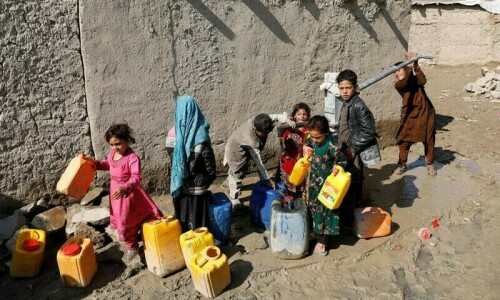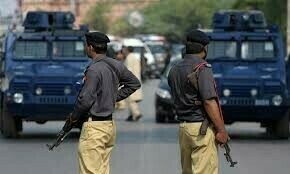THE army-backed crackdown on illegal dollar trade appears to have stopped the black market activities in the country’s foreign exchange market — at least for now. Money changers say there are more sellers in the market now than buyers as the ‘confidence in the home currency returns’, with the dollar weakening in the interbank by nearly five per cent from its historic peak of 307.10 earlier this month.
With a ‘disappearing’ black market, the retail dollar rate has also plummeted, and the gap between the interbank and retail rates narrowed to within the International Monetary Fund-mandated 1.25pc band.
The government launched the crackdown against illicit dollar market and hoarders following the army chief’s back-to-back meetings with the businessmen in Karachi and Lahore, where he promised them to curb smuggling and rein in the consistently deteriorating exchange rate due to unprecedented growth in illegal dollar trade.
Following these meetings, the Federal Investigation Agency started raiding exchange companies across the country, especially in Peshawar, Karachi, Lahore, and Islamabad, shut down scores of shops, and arrested several people involved in illegal transactions.
The SBP decision to allow importers to arrange dollars led to foreign currency being purchased from hundi/hawala operators in Dubai at significant premiums
These stern administrative measures have indeed eased pressure on the key interbank market to the extent that the State Bank of Pakistan (SBP) cited it as one of the key factors that led to holding its policy rate at the June level of 22pc in its last monetary policy statement.
The exchange rate, along with soaring food and energy inflation and critically low foreign reserves, is responsible for significant hardships to the low-middle-income sections of the country’s population.
Now that the crackdown against illegal forex trading and smuggling seems to have stabilised the exchange rate, the bankers have reported an increase in remittances, hoping that these critical inflows will grow to around $2.5 billion in September.
But administrative actions can do only so much: provide market stability to build reforms on as only the foreign exchange demand and supply in the interbank market and the overall macroeconomic landscape of the country will ultimately determine the true currency value.
Realising this, the SBP has recently implemented several measures to restructure the foreign exchange market to quash the illicit hundi-hawala system to curb money laundering and terrorist financing to ensure a closer oversight of financial transactions as required under the Financial Action Task Force regime.
The SBP has raised the capital requirements of the smaller exchange companies besides pushing large banks to open their own exchange companies to make the retail foreign exchange business transparent and traceable and improve compliance. Additionally, it has taken significant steps to financially incentivise both banks and exchange companies to make efforts to boost remittances.
Pakistan’s remittances potential is believed to be in the range of $50bn to $60bn a year, against which a little over $27bn it received during the last financial year — down by $4.3bn from its peak of $31.3bn in 2021-22.
The question is: can Pakistan realise its remittance potential by just cracking down on illegal trades and the recent financial incentives announced by the SBP?
There is no denying the crucial importance of such measures in a country like Pakistan, with porous borders and weak market governance. But these are not enough. The policymakers should also address the longstanding structural issues helping hawala/hundi operators rig the currency market at will and thrive.
Critical factors contributing to bleeding foreign reserves are widely recognised issues of unsustainable trade deficits, low revenue collection, inappropriate government spending and inefficiencies within the power and public sector organisations. Beyond these key contributors, several elements stand out as significant culprits in bleeding the country’s foreign exchange reserves.
The huge demand for dollars from large importers and traders for under-invoicing their imports to evading actual tax payments on their foreign purchases tops the list of factors, impeding efforts to increase the inflow of remittances.
The SBP decision to allow the importers and traders to arrange dollars for imports (to bypass import restrictions) further pushed this demand as they rushed to the grey market to purchase the required dollars from the hawala/hundi operators in Dubai at significant premiums.
“Majority, a careful estimation of 50pc, of shipments are sponsored from UAE, particularly from Dubai. Payments to China and other countries against these imports are also made from the UAE, and the dollars that are supposed to flow into the country go to other countries,” says Rashid Ashraf, the chief executive officer of ACE Group.
The payments for smuggled Iranian oil and gold, as its commercial import is prohibited, are also made through Dubai-based hawala/hundi operators. While the smuggled Iranian oil commands an estimated 30pc of the country’s oil market share, the impact of gold smuggling through airports and shipping containers is estimated by Mr Ashraf to be $5bn on remittances originating from the Middle Eastern countries, which should otherwise flow through formal, documented banking channels.
Likewise, an equal amount of dollars is used to make payments through the hawala/hundi system to under-invoice imports from China. Then, Pakistan is facing a big problem of illicit outflow of dollars to Afghanistan, with official records acknowledging a value of $60-70 million a month. Unofficial estimates suggest that the actual figure could be double this amount, with roughly $150m leaving the country each month, jeopardising the stability of the home currency.
This shows that Pakistan’s anti-money laundering environment is fraught with serious lapses that demand immediate corrections. Even within the banking sector, there is a noticeable deficit in awareness and enforcement, argues Mr Ashraf.
“We have made laws, rules and procedures in the last few years, but we lack in their implementation as well as effective governance. Poor governance has become a bigger problem in recent years because of political instability as the anti-money laundering regime isn’t effectively implemented.
“Dirty money is being allowed to be converted into high-value assets like real estate, gold and cars because no one is asked to provide a source of funds. This is the core problem of our economic troubles,” he adds.
He is of the view that the government should implement a combination of policy, regulatory and administrative measures to make it impossible for anyone to spend dirty money on legal or illegal imports or smuggling, let alone park it in high-value assets.
“One such measure is introducing a proof of funds requirement at our ports for clearing import shipments. This policy will serve as a safeguard, ensuring that only those shipments paid for from within Pakistan’s borders are granted clearance.
“By implementing this system, we can substantially bolster our remittances and foreign exchange reserves, preventing them from being siphoned off to other nations from abroad. Further, securing borders is important to control smuggling, but you can’t do it with total success.
“Hence, the shops selling under-invoiced or smuggled goods should be asked to explain their source of funds and foreign exchange and reveal their suppliers to make it difficult for them to display illegally imported or procured goods on their shelves,” says Mr Ashraf.
He believes the banks should be the first defence against dirty money and the hawala/hundi market. “Pakistan requires stringent regulatory measures, increased surveillance, and international cooperation to dismantle illegal money transfer networks effectively.
“The banks should play the frontline role to achieve this goal. Clients lacking sufficient compliance controls should have their bank accounts terminated. Simultaneously, the SBP should regulate the exchange companies through banks that should report non-compliant companies to the government for penal action against them.”
Published in Dawn, The Business and Finance Weekly, September 25th, 2023















































